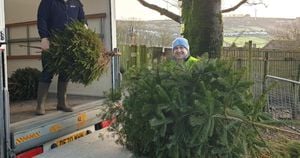Urban birds, particularly those living near human populations, are increasingly recognized as significant carriers of antibiotic-resistant bacteria, raising alarms about public health risks. A new study led by scientists at the University of Oxford highlights troubling findings surrounding urban wildlife.
The research analyzed over 700 bacteria samples from the gut microbiomes of 30 wild bird species across eight countries, including the United States and various European nations. The results revealed urban birds such as crows and ducks contain significantly more antibiotic-resistant genes—up to three times higher—than their rural counterparts.
This growing body of evidence underscores wild birds as potential reservoirs for antimicrobial-resistant bacteria, which is particularly concerning as these birds can migrate vast distances. The study's focus on the bacterium Campylobacter jejuni illustrates how prevalent antibiotic resistance can be, with ramifications not just for nature but also for human and animal health.
Professor Samuel Sheppard, the study's lead author, emphasizes the importance of recognizing these wild birds as agents capable of transferring antibiotic resistance to livestock and pets. Such transfers could have wide-ranging consequences on agriculture, animal welfare, and overall food security.
The study notes the possible contribution of human activity to the proliferation of antimicrobial resistance. Factors such as urbanization have transformed habitats, allowing for increased encounters between humans, domestic animals, and wildlife.
Further complicity stems from the effects of antibiotic usage on farms and improper disposal practices, which can lead to leaching antibiotics from landfills or runoff contaminations. It's important to acknowledge, researchers warn, the interconnectedness of human, animal, and environmental health.
The threat of antibiotic-resistant infections is alarmingly high. Recent statistics from England reported over 58,000 cases of severe infections and more than 2,200 related deaths attributed to such resistance, raising urgent demands for action.
Coordinated efforts among policymakers, healthcare professionals, and wildlife researchers will be necessary to combat the deepening threat of antibiotic resistance. Strategies must incorporate wildlife conservation efforts alongside public health initiatives to mitigate the risks posed by urban birds.
According to experts, proper waste management practices could help limit exposure and reduce the incidence of antibiotic-resistant bacteria spread. Environmental health, animal health, and human health are more closely linked than previously considered.
The findings of the Oxford study serve as both caution and call to action for public health officials. Future research endeavors will focus on these intersections, and it's critical to understand how urban ecosystems influence the spread of antibiotic resistance.
Moving forward, the need for integrative approaches to handle antimicrobial resistance intertwined with urban wildlife management becomes increasingly evident. The consequences of ignoring these connections could pose dire threats to human and animal health.



